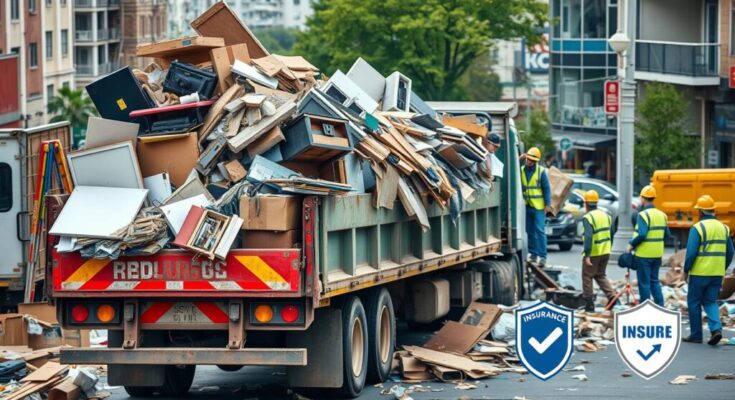Ever thought about what could happen to your junk removal business in an unexpected accident? Accidents can cause property damage and even lead to lawsuits. Without the right insurance, your business could face huge financial losses.
In this guide, we’ll explore the importance of junk removal insurance. We’ll look at different types of insurance and what they cover. Whether you’re starting out or updating your policies, this guide will help you protect your business.
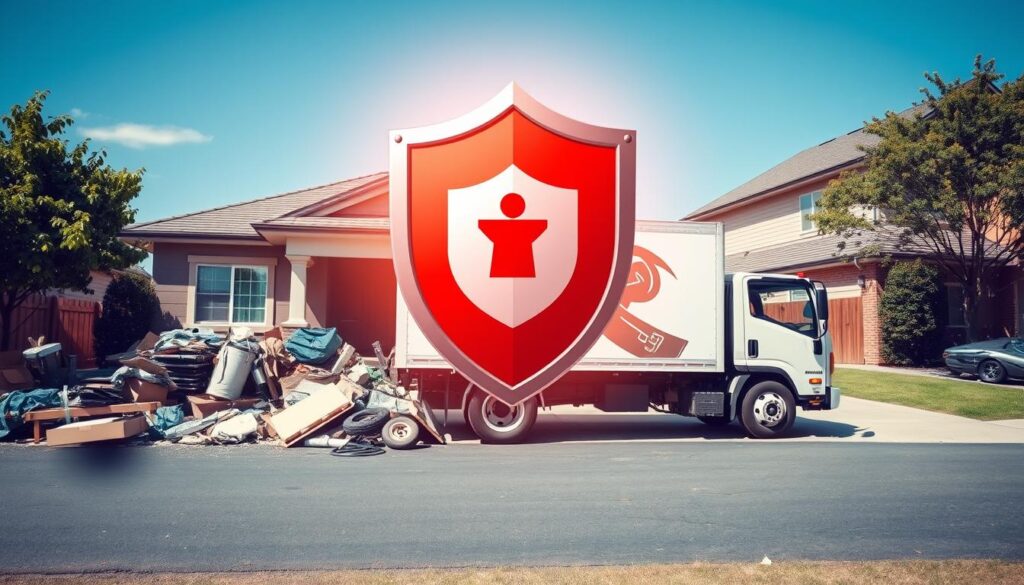
Key Takeaways
- Understanding the necessity of insurance for junk removal business.
- Various types of junk removal insurance available.
- Key coverage options to consider for protection.
- How to evaluate your business’s risk factors.
- Strategies for lowering insurance costs effectively.
Introduction to Junk Removal Business Insurance
Starting a junk removal business is more than just picking up trash. It’s about protecting my investment and keeping things running smoothly. This insurance is made for junk removal, covering things like property damage and personal injury.
Insurance for junk removal is different from regular business insurance. General policies might not fit the needs of junk removal. As more businesses start, the need for special insurance grows.
This insurance is key for my business. It keeps my company safe from big losses and makes clients trust me more. Knowing how important this insurance is helps me understand the junk removal world better.
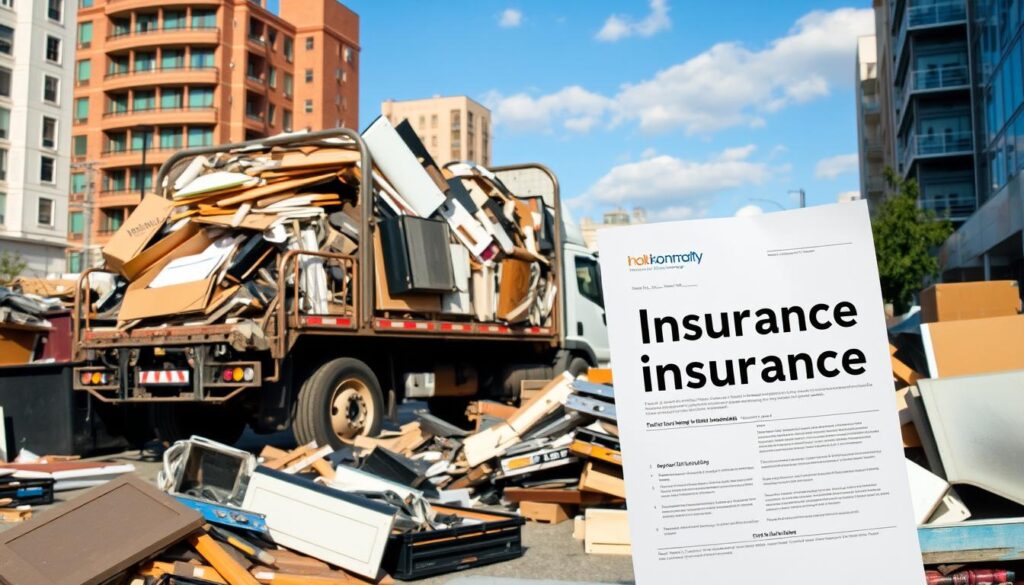
Why Insurance is Essential for Junk Removal Businesses
Insurance is key for junk removal businesses. They face many risks, like accidents and property damage. Without it, I could lose a lot of money, which could hurt my business.
Almost 30% of small businesses face claims or lawsuits. For junk removal, it’s often because of property damage. If a worker damages a client’s property, I could be left with a big bill without insurance. This shows why junk removal insurance is so important.
There are real-life examples that show why insurance matters. A junk removal company without insurance had to pay a lot for a worker’s injury. With insurance, they could have handled the costs better. This saved their money and reputation.
Junk removal businesses also face legal issues. They need to follow local laws and keep employees safe. The right insurance helps protect me from legal problems. It’s clear that junk removal insurance is not just a must; it’s crucial for my business to thrive.
Read More: Safeco Pet Insurance: Coverage for Your Furry Family
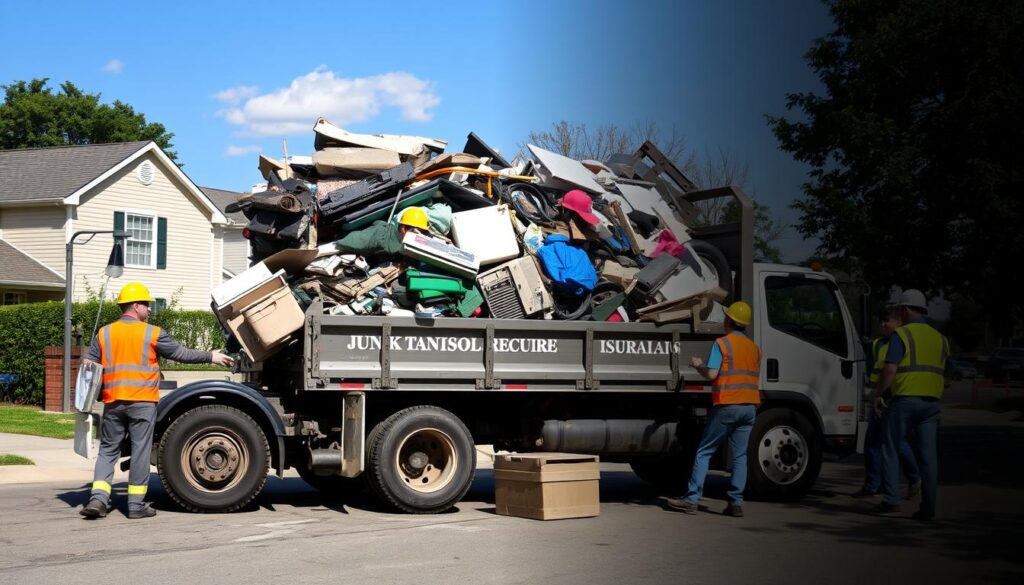
| Risk Factor | Potential Cost Without Insurance | Insurance Coverage Benefits |
|---|---|---|
| Accidents | Medical bills can exceed $50,000 | Covers medical expenses and liability claims |
| Property Damage | Repairs range from $1,000 to $10,000 | Covers repair costs and damages |
| Legal Liabilities | Legal fees can reach $15,000+ | Covers legal defense and settlements |
Types of Insurance for Junk Removal Business
It’s key to know the different insurances for junk removal businesses. Each one helps protect against specific risks. This keeps your business safe and running smoothly. Let’s look at the main insurances every junk removal business needs.
General Liability Insurance
General liability insurance covers claims for bodily injury and property damage. It’s crucial for junk removal businesses. This insurance helps protect against lawsuits, keeping your business safe financially.
Commercial Auto Insurance
Commercial auto insurance is a must for businesses that move waste or debris. It covers damages and liabilities from accidents with business vehicles. This insurance keeps your investment in transportation safe from financial harm.
Workers’ Compensation Insurance
Workers’ compensation insurance protects employees who get hurt on the job. It pays for medical bills and lost wages while they recover. In many places, it’s the law. It gives business owners peace of mind, knowing they’re protecting their workers and following the law.
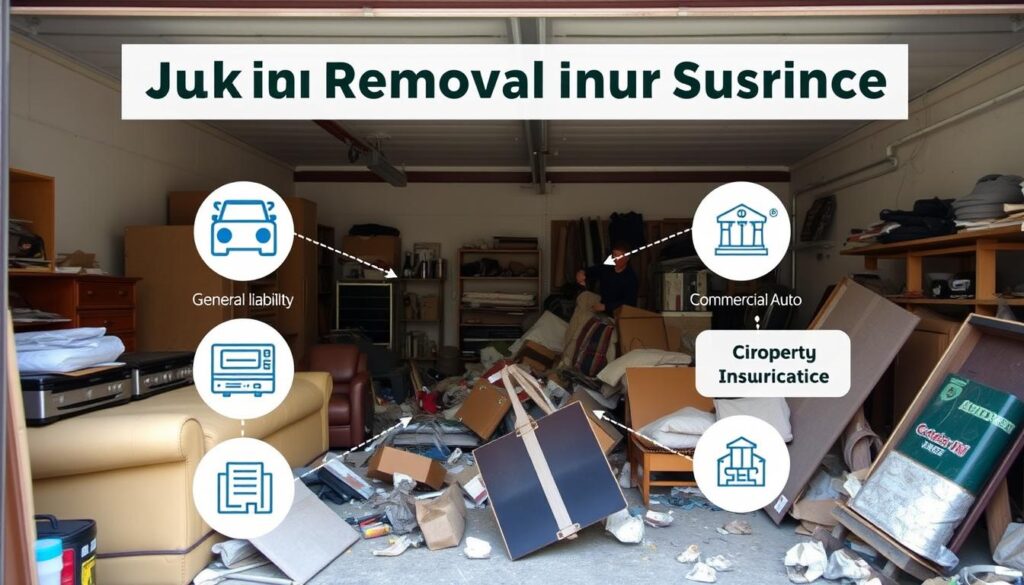
| Insurance Type | Coverage | Importance |
|---|---|---|
| General Liability Insurance | Bodily injury and property damage claims | Protects against lawsuits and financial loss |
| Commercial Auto Insurance | Vehicle-related accidents and damages | Covers business transportation risks |
| Workers’ Compensation Insurance | Employee injuries and medical expenses | Legally required and ensures employee protection |
Understanding Junk Removal Liability Insurance
In the junk removal industry, having strong junk removal liability insurance is key. It acts as a financial shield, covering various incidents that might happen. This includes damage to a client’s property or injuries to my employees.
Liability insurance comes in two main types: general and professional. General liability covers claims from third parties, like property damage or injuries. Professional liability, on the other hand, protects against claims of negligence or service failures.
Knowing the difference between these types helps me choose the right insurance for my business. For instance, if my team damages a client’s property, general liability insurance kicks in. But if giving disposal advice leads to an environmental problem, I need professional liability.
In short, good junk removal liability insurance gives me broad protection against industry risks. It not only gives me peace of mind but also shows my clients I’m serious about quality service.

| Type of Insurance | Coverage Focus | Examples of Protection |
|---|---|---|
| General Liability Insurance | Third-party claims | Property damage, bodily injuries |
| Professional Liability Insurance | Service-related claims | Negligence, service failures |
Insurance Coverage for Junk Removal: What You Need to Know
Junk removal insurance is key for business owners in this field. Knowing the different coverage options is important for protection. I’ll talk about the usual types of coverage and what’s not covered in junk removal insurance.
Common Coverage Options
Several common options are usually offered in junk removal insurance:
- Property Damage: Covers costs if damage happens to client property during removal.
- Personal Injury: Protects against injury claims related to junk removal.
- Equipment Loss: Insures valuable tools and equipment against theft or damage.
Exclusions to Watch Out For
It’s crucial to know about exclusions in junk removal insurance that might affect your coverage:
- Intentional Damage: Damage caused on purpose is not covered.
- Wear and Tear: Normal wear and tear of equipment is usually excluded.
- Hazardous Materials: Removal of hazardous materials might not be covered without special provisions.
How to Choose the Best Insurance for Junk Removal Business
Choosing the right insurance for your junk removal business can seem tough. But, breaking it down into simple steps makes it easier. I look at a few key things when picking junk removal insurance.
First, I compare quotes from different providers. Prices and coverage can vary a lot. So, getting quotes from at least three companies helps me see what’s best for me.
Then, I check how each company handles customer service and claims. Reviews and ratings are useful here. A company with a good reputation for claims handling gives me peace of mind.
Next, I look at the coverage limits of each policy. I ask about the maximum amounts for different claims. Knowing these limits helps me avoid being underinsured when I need it most.
Finally, I consider the premiums and deductibles of each policy. Finding a balance between affordable costs and good coverage is key. This way, I protect my business without breaking the bank.
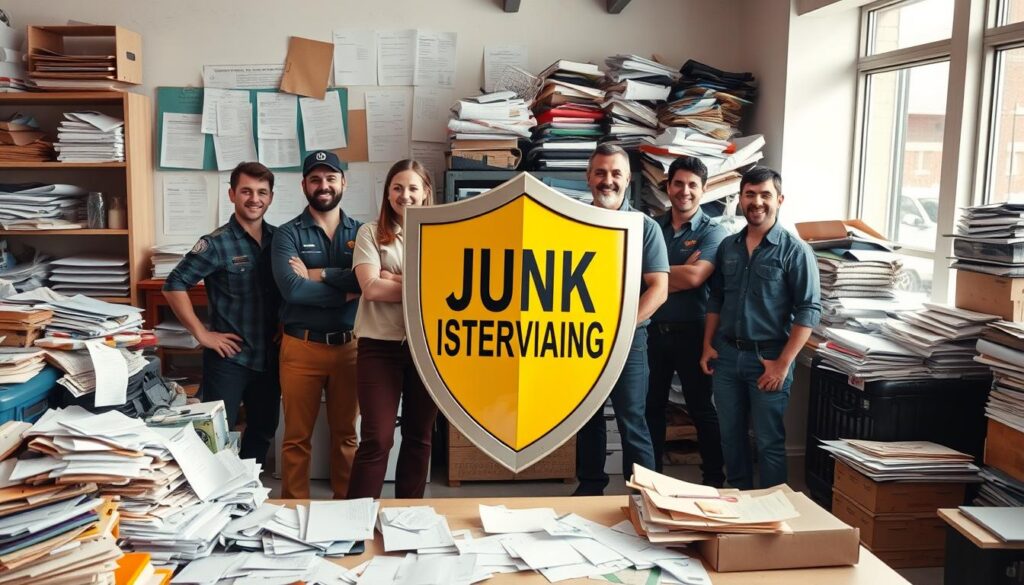
Insurance for Junk Removal Business: Key Considerations
When I think about insurance for my junk removal business, a few key points stand out. It’s important to look at the risks and how big my business is. This helps me find the right insurance that fits my needs.
Assessing Your Risk Factors
Looking at risks is crucial for my junk removal business. The kind of waste I deal with affects my insurance needs. For instance, handling hazardous waste requires special coverage.
The area I work in also matters. Things like weather and local conditions can raise risks. So, it’s important to consider these factors when choosing insurance.
- Type of Materials Handled
- Geographical Area
- Workforce Size
- Operational Equipment
Evaluating Your Business Size and Scope
The size of my junk removal business affects my insurance costs. A bigger team needs more protection than a small one. Knowing how often I work and who my clients are helps me figure out what coverage I need.
| Business Size | Coverage Level | Example Costs |
|---|---|---|
| Small (1-3 workers) | Basic Coverage | $1,000 – $1,500/year |
| Medium (4-10 workers) | Intermediate Coverage | $1,500 – $3,000/year |
| Large (10+ workers) | Comprehensive Coverage | $3,000 – $5,000+/year |
Junk Removal Insurance Policy: What to Look For
When I look for junk removal insurance, I focus on key elements for full protection. It’s important to know the junk removal insurance policy features to make the right choice. Here are the main points to consider when comparing policies.
First, I check the coverage limits. These limits show how much the insurance will pay for claims. It’s crucial to pick a policy with enough coverage for my business. Higher limits help manage risks for big or special jobs.
Then, I look at deductibles. A deductible is what I pay before the insurance starts covering. Finding the right balance is key. A lower deductible means less money out of pocket for claims, but a higher one can lower premiums. Knowing this helps me choose based on my budget.
Endorsements are also important. These are extra coverages that can tailor my policy to my business’s specific risks. I look for endorsements that fill any gaps in my coverage to boost my protection.
Lastly, policy flexibility is crucial. As my junk removal business changes, I need a policy that can too. I check how easy it is to change my coverage to keep up with my business’s growth or changes.
| Policy Feature | Description | Considerations |
|---|---|---|
| Limits of Coverage | Maximum amount the policy will pay for covered claims. | Ensure limits match business needs. |
| Deductibles | Amount paid out of pocket before insurance applies. | Balance between premiums and out-of-pocket costs. |
| Endorsements | Add-ons to customize coverage for specific risks. | Consider common endorsements relevant to junk removal. |
| Flexibility | Ability to adapt the policy as business evolves. | Look for options to adjust coverage without much hassle. |
By focusing on these features, I can find a junk removal insurance policy that fits my business now and in the future. Knowing the key features of junk removal insurance helps me protect my business proactively.
Comparing Junk Removal Business Insurance Quotes
When looking at junk removal business insurance quotes, comparing them is key. It’s important to understand the policy terms to avoid surprises. Each company offers different coverage, limits, and exclusions, affecting your business’s protection.
Understanding Policy Terms
It’s crucial to read the fine print of insurance policies. Terms like deductibles, coverage limits, and exclusions can vary a lot. I make sure to ask about:
- Deductible: This is the amount I must pay before my coverage starts.
- Coverage Limits: The maximum my insurer will pay for a covered loss.
- Exclusions: Specific risks or damages not covered by the policy.
Factors Affecting Insurance Quotes
Several things can change the insurance market for junk removal, affecting quotes:
- Business History: A clean record can lower premiums.
- Claims Record: Past claims can raise costs.
- Coverage Options: More comprehensive coverage can mean higher quotes.
I keep looking at quotes based on these factors to find the best plan for my junk removal business.
Insurance Options for Junk Removal Company
Running a junk removal company means knowing about insurance options. These options are key to keeping my business safe and running long-term. It’s important to look at different junk removal insurance types to get the right coverage for my needs.
Some notable insurance options for junk removal companies include:
- Excess Liability Insurance: This coverage helps with claims that go beyond my general liability policy. It’s an extra layer of protection for unexpected events.
- Equipment Coverage: My tools and machinery are essential. This insurance protects my business from damage or loss to my equipment on job sites.
- Pollution Liability Insurance: Since I handle different waste, this insurance guards my business against pollution-related liabilities during the removal process.
When choosing insurance for my junk removal company, a balanced approach is crucial. The right junk removal insurance types keep my business running smoothly, avoiding big financial hits from surprises.
Understanding these insurance options is a smart investment. It helps me make choices that fit my business’s unique risks and needs, boosting my operation’s safety.
Tips for Lowering Your Junk Removal Insurance Costs
There are many ways to lower junk removal insurance costs. You can get the best coverage for your needs without spending too much. By using these strategies, you can save a lot without giving up the protection your business needs.
One good way is to bundle your insurance policies. When you combine different coverages, like general liability and commercial auto insurance, you can get discounts. These discounts help you save on junk removal insurance.
Keeping your work area safe is also key. Regular safety checks and following safety rules can lower claim risks. This makes your business more attractive to insurers, leading to lower premiums.
Investing in your employees’ training is crucial too. Good training reduces accidents and shows insurers you care about safety and professionalism. This can lead to lower insurance costs.
Also, make sure your vehicles are up to date. Older vehicles can be riskier and cost more to insure. Keeping your fleet well-maintained and updated can help lower these risks.
Finally, working with an insurance broker who knows the junk removal industry can help you save. Brokers can find better rates for you. They understand your business needs and can negotiate lower costs.
Legal Requirements for Insurance in the Junk Removal Industry
Running a junk removal business means knowing the legal insurance needs. Each state has its own rules about what insurance is needed. It’s crucial to know these rules to stay legal and protect your business.
The main legal needs include:
- General liability insurance, which protects against claims related to bodily injury or property damage.
- Commercial auto insurance for vehicles used in the junk removal process.
- Workers’ compensation insurance to cover employee injuries while on the job.
Meeting these insurance standards helps protect my business from unexpected problems. Also, many clients want to see proof of insurance before they hire me. This makes following these rules not just legal, but also important for getting customers.
Conclusion
This guide is a detailed look at junk removal insurance. It shows how important it is for your business. As a junk removal business owner, I know how crucial it is to have the right insurance. It covers all parts of my business against unexpected problems.
Looking back, I see how vital it is to check my insurance often. My business changes, and so do the risks. Checking my insurance regularly helps keep my business safe and makes smart choices easier.
Being ahead with my insurance lets me relax and run my business well. It’s key for every owner to focus on this. This way, their business can grow without losing protection.
FAQ
What is junk removal insurance?
Junk removal insurance is special coverage for junk removal businesses. It protects against property damage, personal injury, and lawsuits. It’s different from regular business insurance because it’s made for junk removal services.
Do I really need insurance for my junk removal business?
Yes, you need the right insurance for your junk removal business. It helps cover accidents, property damage, and claims from employees or customers. This way, you can avoid big financial losses and keep your business safe.
What types of insurance should I consider for my junk removal company?
You should think about general liability insurance, commercial auto insurance, and workers’ compensation insurance. Each one is important for different parts of your business, like vehicles and employee safety.
What does junk removal liability insurance cover?
Junk removal liability insurance helps protect your business from accidents, property damage, and injuries. It also covers claims from others, keeping you safe from legal problems.
How can I find the best insurance for my junk removal business?
To find the best insurance, compare policies from different providers. Look at customer service, claims handling, coverage limits, and premiums. Getting quotes is key to making a good choice.
What are the common exclusions in junk removal insurance?
Junk removal insurance might not cover intentional damage, wear and tear, or certain activities. Knowing what’s not covered helps you choose the right policy for your business.
Are there legal requirements for junk removal insurance?
Yes, junk removal businesses must follow state laws about insurance. It’s important to know and follow these rules to operate legally and protect against claims.
How can I lower my junk removal insurance costs?
To save on insurance, consider bundling policies, keeping your workspace safe, and training employees. Also, maintain your vehicles well. Working with an experienced broker can help you find better deals.
What specific coverage options should I look for in a junk removal insurance policy?
Look for coverage limits, deductibles, and endorsements that improve your protection. Choose policies that can grow with your business.
How do I assess the risks specific to my junk removal business?
To assess risks, think about the materials you handle, where you work, and how many people you have. This helps you get the right coverage for your business’s unique risks.

